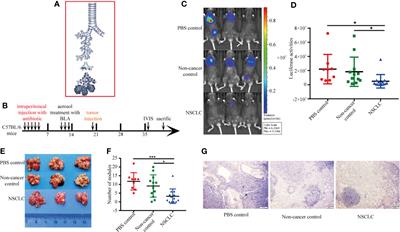
Lung cancer is the most common cancer type around the world. Although major advances in cancer therapy, lung cancer has been the largest proportion of all cancer-related deaths. The respiratory tract contains many types of bacteria and a distinct lung microbiome in lung cancer patients was described in many studies. The specific roles of these lung microorganisms in lung cancer progression remain unclear. In this study, we evaluated the effect of inhalation of bronchoalveolar fluid (BAL) in the lung cancer c ell growth. The microbiome-based immune and carcinogenesis was examined in tumor-bearing mouse model. We found that inhalation of BAL collected from non-small cell lung cancer (NSCLC) patients altered the lung microbiota and inhibited tumor cell growth. The inhibitory effect was due to the infiltration of CD3 and CD8+ T cells and decrease of M2 macrophages in lungs. The microbial communities of NSCLC BAL inhalation group were dominated by Pasteurella, whereas the microbial communities of non-cancer control and PBS inhalation group were dominated by Delftia. Linear discriminant analysis (LDA) indicated that the genera Pasteurella, Pseudomonas, and Chryseobacterium were increased in NSCLC BAL inhalation group, while genera Delftia, Ezakiella, Blautia, Cloacibacterium, and Microvirga et al. were increased in PBS and Non-cancer group. We demonstrated a significant positive correlation between Pasteurella and cytotoxic CD8+ TIL and a negative correlation with M 2 macrophages. Coriobacteriaceae was positively correlated with M2 macrophages and negatively correlated with CD8+ cells. The abundance of Pasteurella was negatively correlated with tumor cell growth. Our findings provide a promising strategy that can be used as a therapeutic vaccine for lung cancer patients.



Δεν υπάρχουν σχόλια:
Δημοσίευση σχολίου
Σημείωση: Μόνο ένα μέλος αυτού του ιστολογίου μπορεί να αναρτήσει σχόλιο.